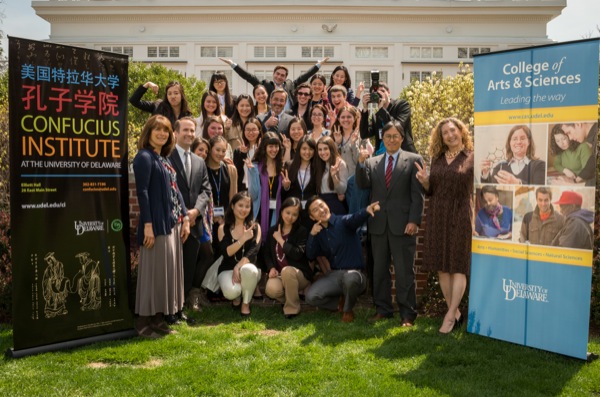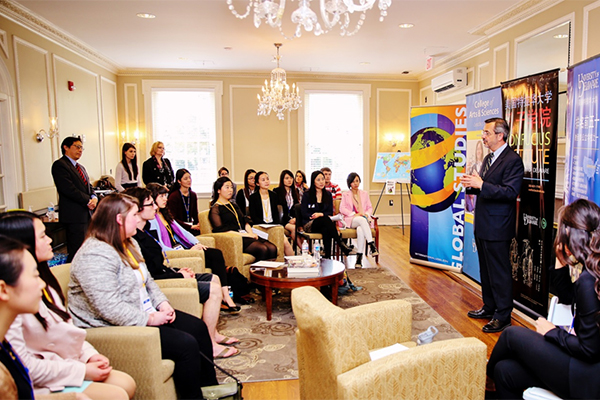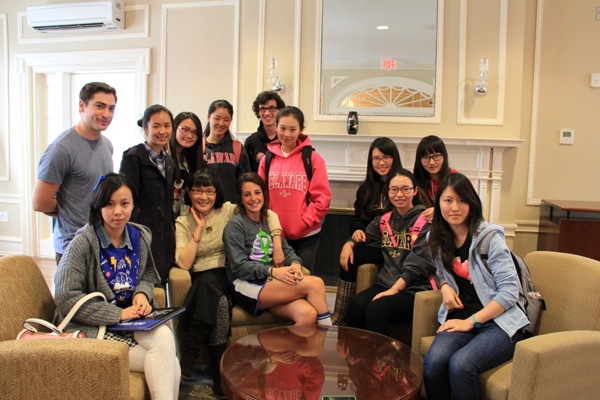US-China Student Forum
Forum encourages cross-cultural communications, creates friendships
1:40 p.m., May 30, 2014--For two weeks in late April through early May, student delegates from East China Normal University (ECNU) and Xiamen University (XU) sat alongside University of Delaware student delegates exploring the humanities and discovering cultural differences during the 2014 U.S.-China Student Forum (USCSF).
The theme of USCSF was “Cross-Cultural Perspectives on the Humanities,” and the forum brought together UD faculty, visiting Chinese students and UD students to explore the many facets of the liberal arts.
Global Stories
Fulbright awards
Peace Corps plans
Interactions between the students, as well as classes and trips, promoted cross-cultural cooperation and understanding and sparked group discussions and friendships.
Co-directors Matthew Kinservik, newly appointed vice provost for faculty affairs, and Jianguo Chen, director of the Confucius Institute, said they were pleased and excited with the outcome of the forum and the growth of the students throughout the two weeks.
“We hoped this would be an opportunity for personal development and cross-cultural learning specific to the humanities,” said Kinservik.
During their time at UD, Chinese students attended lectures and discussions led by specialists in various disciplines in the humanities, stayed with host families, interviewed students of the Osher Lifelong Learning Institute at UD, were immersed in American culture, traveled to New York City, Washington, D.C., and Philadelphia, as well as numerous Delaware sites, including Winterthur, the Hagley Museum and Library and Historic New Castle.
Throughout their experiences students kept journals to reflect on each day and what stood out to them the most.
“We told the students because these thoughts are so different to you, you must have a response and record it so you do not forget,” said Chen.
Open dialog
Students said that throughout the weeks their language skills improved because they learned how to “chat with people,” and said the post-class discussions were among their favorite parts of the experience.
“I liked the discussion because I think when I talk to others about what I learned myself, then what I learned from the class is internalized, and we also learn new perspectives,” said Jingjin Luo.
According to the students, in China the professor-student interaction is much different. They are not encouraged to ask questions during a lecture and do not engage in class discussion.
“I noticed here the professors would ask ‘What do you think, do you have any questions?’ That doesn’t happen at my university,” said Luo.
UD students also enjoyed their time participating in the forum.
“The experience was awesome especially because when I went to China they welcomed me, so I wanted to welcome them,” said Chrissy Casiello.
“U.S. and China are so intertwined in our globalized world that we are going to have to take massive strides to bridge the cultural gaps,” said Graham Essender, who has studied abroad in China multiple times. “It was really cool the freedom we had during our discussions including in Prof. Jenkins’ class.”
McKay Jenkins, Cornelius A. Tilghman Professor of English, led a class on “Environmental Impact of Chinese Production and American Consumption on Consumer Goods,” which sparked a long discussion on the second day of the forum allowing students to fully open up to the idea of group discussion.
“I loved his class -- loved cannot be explained. There was lots of room for discussion and the topic is what I am interested in – industrial problems,” said Jiao Jun. “He let us ask more questions. I now have a totally new view about some problems.”
Lu Siyi said one of her favorite experiences was the theatre and drama class where they listened to rock and roll music and the popular song Happy.
“The professor wanted us to tell him the difference in how we felt. This changed what I understand about the answer to ‘what is art?’” said Siyi. “Now I think art is how you express your feeling and reach other people. We got the chance to feel more things than just reading it from a book.”
“They talked substantially but very personally, and they aren’t invited to do that usually,” said Kinservik.
Out of classroom experiences
Students said they thoroughly enjoyed the academic components of the forum, and also allowed themselves to open up to the cultural differences.
“Home stay is an important component of this program, by means of which the Chinese student delegates were able to experience American life and culture on a first-hand basis,” said Chen.
Jun decided to donate 15 inches of hair when she heard about Casiello’s philanthropic experiences, and Siyi made an upside-down pineapple cake with her host mother, disproving a stereotype that Americans only liked hotdogs and hamburgers.
Through observing, understanding and discussion, students were able to better understand cultural differences. Based on their discoveries, students chose a topic to present their final projects on at the open forum debate and presentation.
Students presented on a number of topics including “A Cross-Cultural Perspective on ‘Self-Cultivation,’” ”The Importance of Humanities in STEM Education,” “Chinese Cinderella,”“A Cross-Cultural Reading of Pearl Buck’s The Good Earth,” and more.
“The interaction between students made this a distinguished forum. What made this really memorable were the UD students being a part of it, and we could not be more proud,” said Kinservik.
Future plans
USCSF initiated dialogue across the Chinese and American cultures and the hope of organizers was that it deepened friendship between the students and, ultimately, the two countries. The success of the inaugural program will help promote exchanges between both countries in the future.
After the USCSF at UD, it is certain the forum will be held annually, rotating among host institutions, and future plans may include opportunities for graduate students.
“Next year’s U.S.-China Student Forum will take place in Shanghai. We encourage more UD students to participate in this cross-cultural dialogue for global perspectives that are essential to us as world citizens,” said Chen.
To see highlights from the trip including photos taken by students visit the USCSF Storify page.
Through its global initiative, the University of Delaware is focused on strengthening ties and furthering collaboration with partnering universities. The relationship between the College of Arts and Sciences and Chinese institutions has been nurtured for years through the efforts of many UD faculty and senior administrators, including CAS Dean George Watson, Kinservik, Chen and Jenkins, among others.
USCSF was sponsored by the Confucius Institute, College of Arts and Sciences, Institute for Global Studies, and Department of Foreign Languages and Literatures.
Article by Elizabeth Adams
Photos by Kathy F. Atkinson and courtesy of the Institute for Global Studies













